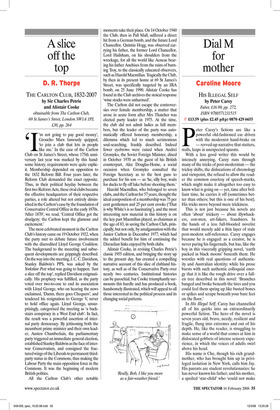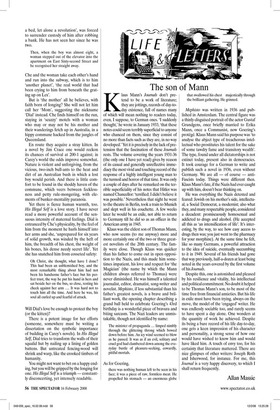Dial M for mother
Caroline Moore
HIS ILLEGAL SELF by Peter Carey Faber, £16.99, pp. 272, ISBN 9780571231515 ✆ £13.59 (plus £2.45 p&p) 0870 429 6655 Peter Carey’s fictions are like a powerful old-fashioned car driven with the modernist hand-brake on — revved-up narrative that stutters, stalls, leaps in unexpected spasms.
With a less good writer this would be intensely annoying. Carey runs through many of the tricks of post-modernism — the tricksy shifts, the dislocations of chronology and viewpoint, the refusal to allow the reader the common courtesy of speech-marks, which might make it altogether too easy to know what is going on — yet, time after brilliant time, he carries it off (sometimes better than others; but this is one of his best). His tricks move beyond mere trickiness.
This is not just because his novels are often ‘about’ trickery — about illywhackers, con-men, art-fakers, fraudsters. In the hands of a less full-blooded novelist that would merely add a thin layer of stale post-modern self-reference. Carey engages because he is engaged: as a creator, he is never paring his fingernails, but has, like the boy in this viscerally gripping novel, ‘earth packed in black moons’ beneath them. He wrestles with real questions of authenticity and Australian identity; while his prose bursts with such authentic colloquial energy that it is like the rough drive over a fallen tree described in this novel: ‘Branches banged and broke beneath the tires and you could feel them spring up like busted bones or spikes and scrape beneath your bare feet on the floor.’ In His Illegal Self, Carey has channelled all of his quirks into an extraordinarily powerful fiction. The hero of the novel is seven years old, brave, needy, resilient and fragile, flung into extremes and out of his depth. He, like the reader, is struggling to make sense of a world that comes at him in dislocated gobbets of intense sensory experience, in which the voices of adults swirl above his head.
His name is Che, though his rich grandmother, who has brought him up in privileged isolation in New York, calls him Jay. His parents are student revolutionaries: he has never known his father; and his mother, a spoiled ‘star-child’ who ‘could not make a bed, let alone a revolution’, was forced to surrender custody of him after robbing a bank. He has not seen her since he was two.
Then, when the boy was almost eight, a woman stepped out of the elevator into the apartment on East Sixty-second Street and he recognised her straight away.
Che and the woman take each other’s hand and run into the subway, which is to him ‘another planet’, ‘the real world that had been crying to him from beneath the grating up on Lex’.
But is ‘the mother’ all he believes, with faith born of longing? She will not let him call her ‘Mom’, suggesting the nickname ‘Dial’ instead. Che finds himself on the run, staying in ‘scuzzy’ motels with a woman who may or may not be his mother and their wanderings fetch up in Australia, in a hippy commune hacked from the jungles of Queensland.
En route they acquire a stray kitten. In a novel by Jim Crace one would reckon its chances of survival at 200-1 against; in Carey’s world the odds improve somewhat. Nature is violent and unforgiving, from the vicious, two-inch bull-ants to the heat and dirt of an Australian bush in which a lost boy would perish. And there is little comfort to be found in the shoddy haven of the commune, which veers between fecklessness and petty rule-mongering, with elements of bunker-mentality paranoia.
Yet there is fierce human warmth, too. His Illegal Self is a love story. I have never read a more powerful account of the sensuous intensity of maternal feelings. Dial is entranced by Che’s physicality, by the feel of him from the moment he hurls himself into her arms and she, ‘unprepared for six years of solid growth, was winded by the heft of him, the breadth of his chest, the weight of his bones, his dense needy secret life’. Yet she has snatched him from cosseted safety:
Oh Christ, she thought, what have I done? This had been an unblemished boy, and the most remarkable thing about him had not been his handsome father’s face but his perfect trust, the way he put his hand in hers and sat beside her on the bus, so close, resting his cheek against her arm .... It was hard not to touch him all the time. And here he was, his soul all curled up and fearful of attack.
Will Dial’s love be enough to protect the boy (or the kitten)?
There is a potent image for her efforts (someone, somewhere must be writing a dissertation on the symbolic importance of building in Carey’s novels). In His Illegal Self, Dial tries to transform the walls of their squalid hut by nailing up a lining of golden battens. But untreated fencing-wood will shrink and warp, like the crooked timbers of humanity.
You might not want to bet on a happy ending, but you will be gripped by the longing for one. His Illegal Self is a triumph — constantly disconcerting, yet intensely readable.



















































































 Previous page
Previous page